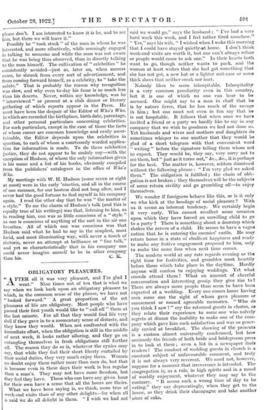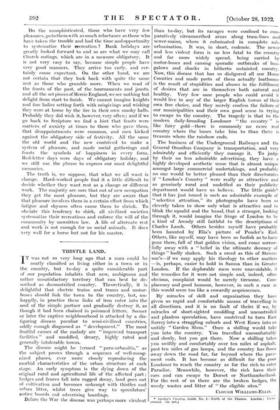OBLIGATORY PLEASURES. "A FTER all it was very pleasant, and I'm
glad I went." Nine times out of ten that is what we say when we look back upon an obligatory pleasure to which, in the common sense of the phrase, we have not " looked forward." A great proportion of the set pleasures of life are obligatory. Most people who have passed their first youth would like to " call off " them at the last minute. For all that they would find life very dull if they gave in to a momentary sense of distaste,•and they know they would. When not confronted with the immediate effort, when the obligation is still in the middle of next week, it looks rather alluring, and they go on entangling themselves in fresh obligations still further off. The reason they do so is, whatever the cynics may say, that while they feel their short liberty curtailed by their social duties, they very much enjoy them. Women no doubt enjoy them rather more than men do, but that is because even in these days their work is less regular than a man's. They may not have more freedom, but they feel they have. Those who can have any given hour for their own have a sense that all the hours are theirs.
What we have been saying is, we think, more true of week-end visits than of any other delights—for when all is said w e do all delight in them. " I wish we had not said we would go," says the husband ; " I've had a very hard week this week, and I feel rather tired somehow."
" Yes," says his wife, " I wished when I woke this morning that I could have stayed quietlygat home. I don't think week-end visits are worth it, but one can't always refuse or people would cease to ask one." In their hearts both want to go, though neither wants to pack, and the woman at least wishes that she had got something that she has not got, a new hat or a lighter suit-case or some thick shoes that neither creak nor hurt.
Nobody likes to seem inhospitable. Inhospitality is a very common peculiarity even in this country, but it is one of which no one can bear to be accused. One might say to a man in chaff that he is by nature fierce, that he has much of the savage in him ; but one must not even in fun say that he is not hospitable. It follows that when once we have invited a friend or a party we hardly like to say in any company that we wish to goodness we had not done so. Yet husbands and wives and mothers and daughters do sometimes whisper to one another that they would be glad of a short telegram with that convenient word " writing " before the signature telling them whom not to expect. They would be, they say, very sorry not to see them, but " just as it turns out," &c., &c., it is perhaps for the best. The matter is, however, seldom dismissed without the following phrase : " I'm very glad we asked them." The obligation is fulfilled ; the chain of obli- gation is not broken ; they themselves will be the subjects of some return civility and go grumbling off—to enjoy themselves.
We wonder if foreigners behave like this, or is it only we who kick at the bondage of social pleasure ? With us it seems an inherent tendency. We certainly begin it very early. Who cannot recollect some occasion upon which they have forced an unwilling child to go to a party ? There is something about a doorstep which shakes the nerves of a child. He seems to have a vague notion that he is entering the enemies' castle. He may return home in a state of ebullient happiness and ready to make any festive engagement proposed to 'him, only to make the same fuss when next time comes.
The modern world at any rate regards evening as the right time for festivities, and grumbles most heartily before those which take place in the daytime. Hardly anyone will confess to enjoying weddings. Yet what crowds attend them ! What an amount of cheerful. conversation and interesting gossip they give rise to I There are always more people than seem to have been expected at a wedding. Every one comes home having seen some one the sight of whom gave pleasure or amusement or roused agreeable memories. " Who do you think I saw ! " cry the returned guests in chorus, as they relate their experience to some one who naively regrets at dinner the inability to make one of the com- pany which gave him such satisfaction and was so gener- ally envied at breakfast. The showing of the presents is a custom almost universally condemned, but how anxiously the friends of both bride and bridegroom press in to look at them ; even a list in a newspaper finds readers ! The conduct of wedding guests in church is a constant subject of unfavourable comment, and truly it is not always very reverent. We need not, however, suppose for a moment that irreverence is intended. The congregation is, as a rule, in high spirits and in a mood of worldly enjoyment, whatever they may say to the contrary. " It seems such a wrong time of day to be eating," they say deprecatingly, when they get to the house, as they drink their champagne and take another piece of cake. Do the unsophisticated, those who have very few pleasures, go to them with as much reluctance as those who have taken the trouble and had the time and opportunity to systematize their tecreation ? Bank holidays are greatly looked forward to and so are what we may call Church outings, which are in a measure obligatory. It is not very easy to say, because simple people have very good manners. They arrive too early, and cer- tainly come expectant. On the other hand, we are not certain that they look back with quite the same zest as thoSe who grumble more. When we read Of the feasts of the past, of the tournaments and jousts, and all the set pieces of Merrie England, we see nothing but delight from start to finish. We cannot imagine knights and fine ladies setting forth with misgivings and wishing they were at home by the fire in their own smoky halls. Probably they did wish it, however, very often; and if we go hack to Scripture we find a hint that feasts were matters of anxiety at times to those who gave them, that disappointments were common, and men kicked against the obligatory side of festivity. All the same the old world and the new contrived to make a system of pleasure, and made social gatherings and feasts the symbols of happiness in every form. Red-letter days were days of obligatory holiday, and we still use the phrase to express our most delightful memories.
The truth is, we suppose, that what we all want is change. Hard-worked people find it a little difficult to decide whether they want rest as a change or different work. The majority are sure that out of new occupation they get the most pleasure, but they are aware that that pleasure involves them in a certain effort from which fatigue and shyness often cause them to shrink. To obviate this tendency to shirk, all civilized societies systematize their recreations and enforce the will of the community by unwritten law. A life of alternate rest and work is not enough for us social animals. It does very well for a horse but not for his master.











































 Previous page
Previous page